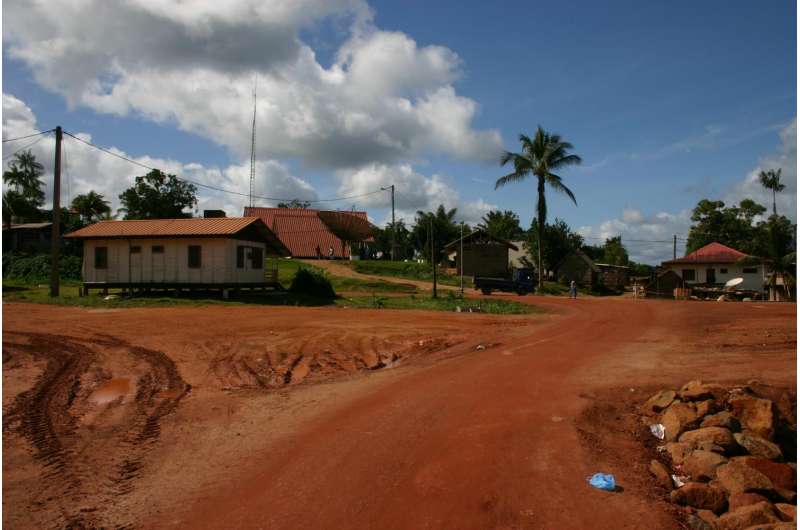December 12, 2016 weblog
Deforestation in French Guiana linked to increase in infectious tropical disease

(Phys.org)—An international team of researchers has found evidence that suggests human deforestation efforts in French Guiana has led to an increase in the number of animals and insects infected with the tropical disease Buruli ulcer. In their paper published in the journal Science Advances, the team describes their study of the bacteria that causes the disease and what their findings imply for the study of the spread of diseases in such areas.
People have been cutting down the rain forests for years to provide land for human activities. While some of the ecological impacts of deforestation is evident, such as the reduction in amounts of carbon dioxide the remaining rainforests can pull from the atmosphere, others are not so clear. In this new effort, the researchers sought to learn more about the possible impact on the spread of infectious diseases.
Prior research has found links between human environmental impact and the spread of diseases such as malaria and Zika, but other less well-known diseases might be impacted as well. One such disease, known as Buruli ulcer, results in skin ulcers and bone damage. It is caused by infection of the bacterium Mycobacterium ulcerans, generally in tropical areas. But what happens with these bacteria when tropical forests are cut down? To find out, the researchers ventured to French Guiana, where people are commonly infected with Buruli ulcer. They collected approximately 3,000 organisms from 17 places around the country and then tested each for M. ulcerans. In studying the numbers, they discovered that the bacteria are not particularly fond of any given host—they will infect a wide range of insects, fish and many other invertebrates. They also noted that infections were more prevalent the farther down the food chain they looked. The team also noted the locations of the organisms they collected and found that in places where deforestation had occurred, there were, quite naturally, fewer organisms that lived higher up on the food chain. This in turn led to increases in the numbers of those they normally preyed upon and that led to more infections in lower order animals by M. ulcerans.
The researchers did not compare their findings against increased human infections, but the data suggests it as a likely possibility, which, in a broader sense, offers yet more evidence of the negative consequences of deforestation of the rain forests—a possible increase in the spread of bacterial infections—at least initially. Their research also showed that as deforested land was converted to human use, even lower-order organisms were eventually pushed out, along with the bacteria they were carrying.
More information: A. L. Morris et al. Deforestation-driven food-web collapse linked to emerging tropical infectious disease, Mycobacterium ulcerans, Science Advances (2016). DOI: 10.1126/sciadv.1600387
Abstract
Generalist microorganisms are the agents of many emerging infectious diseases (EIDs), but their natural life cycles are difficult to predict due to the multiplicity of potential hosts and environmental reservoirs. Among 250 known human EIDs, many have been traced to tropical rain forests and specifically freshwater aquatic systems, which act as an interface between microbe-rich sediments or substrates and terrestrial habitats. Along with the rapid urbanization of developing countries, population encroachment, deforestation, and land-use modifications are expected to increase the risk of EID outbreaks. We show that the freshwater food-web collapse driven by land-use change has a nonlinear effect on the abundance of preferential hosts of a generalist bacterial pathogen, Mycobacterium ulcerans. This leads to an increase of the pathogen within systems at certain levels of environmental disturbance. The complex link between aquatic, terrestrial, and EID processes highlights the potential importance of species community composition and structure and species life history traits in disease risk estimation and mapping. Mechanisms such as the one shown here are also central in predicting how human-induced environmental change, for example, deforestation and changes in land use, may drive emergence.
Journal information: Science Advances
© 2016 Phys.org















